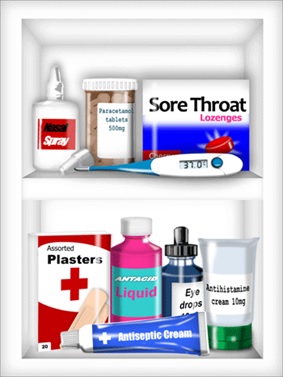 We are keen to help patients improve on self help and hope that the following information will offer some insight into that.
We are keen to help patients improve on self help and hope that the following information will offer some insight into that.
Take a look and see if you can improve your own understanding of your health and well-being! Please encourage others to look here too.
Here is a list of ailments that can be safely self managed. You will see that you can take a look via the hyperlink at the other websites which can offer you further information about managing your condition.
Common ailments that can be self managed :
As well as our practice, there are many other local NHS services you can contact for health advice, information or treatment.
Before you do, remember that you can treat many minor ailments such as colds, coughs and indigestion by keeping a well-stocked medicine cabinet at home.
We suggest you keep the following:
- Paracetamol and aspirin (children under 16 and people with asthma should not take aspirin)
- Mild laxatives
- Anti-diarrhoeal medicines
- Rehydration mixture
- Indigestion remedy (for example, antacids)
- Travel sickness tablets
- Sunscreen – SPF15 or higher
- Sunburn treatment (for example, calamine)
- Tweezers and sharp scissors
- A thermometer
- A selection of plasters, non-absorbent cotton wool, elastic bandages and dressings
Remember:
- Keep the medicine chest in a secure, locked place out of reach of small children
- Always read the instructions and use the suggested dose
- Watch expiry dates – don’t keep or use medicines past their sell-by date
- Take all unwanted and out-of-date medicines back to the pharmacy